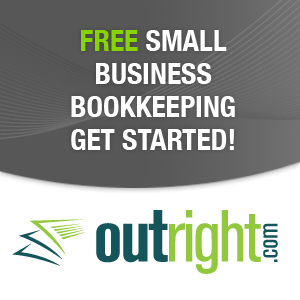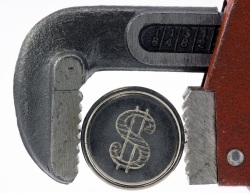This post is sponsored by Outright — Your Livelihood, Right Now. Getting your taxes right with free bookkeeping.
This post is meant to give you a little peek inside of a business that we here at Freelance-Zone think is a great match for our readers. I, for one, hate keeping books–but I know that it is a necessary evil. I was excited to learn about Outright, and the thought of having all my records with me on the laptop is an appealing thing. We took some time to talk with Jennifer Escalona from Outright to bring you a closer look at what they are all about. With tax time approaching, you may want to consider signing on…
1. What is Outright.com?
Outright.com is a free online accounting service that makes bookkeeping simple so that you can keep track of income, expenses, and taxes easy and – dare I say it – fun.
2. How can freelance writers benefit from connecting with them?
When I started freelance writing, I kept track of my income on an Excel spreadsheet. I was so naïve that I didn’t even think about keeping track of my expenses until I’d been freelancing for months. There went those tax deductions.
I’ve heard stories of other freelance writers who buy complicated accounting software programs and then get so overwhelmed by all the bells and whistles that they fail to track their income and expenses at all. This is a big no no. You have to pay those darn estimated taxes, and it’s always vital to watch how much money is coming in and going out so you can adjust your business accordingly.
That’s why I was so thrilled when I found Outright. (I was an Outright.com user first. Working with them came later.) I’m a writer partially because numbers terrify me, but Outright.com gives me detailed charts and graphs of my income and expenses, and estimates for me the amount of federal taxes I need to pay every quarter. Better yet, it prints a Schedule C for me at the end of the year so that I can pay my annual income taxes with as little hassle as possible.
All freelance writers can benefit from a clear representation of how much money is coming in and how much money is going out. They can also easily keep track of deductions on Outright.com, which means they pay a little less at tax time. Who doesn’t want that?
3. What are some of the specific features that freelancers might find useful?
As a freelance writer, many clients pay me through Paypal, so Outright’s integration with Paypal has saved me hours of manual data entry. Outright.com also integrates with oDesk, where many freelance writers find jobs, and several other services, like Freshbooks and Shoeboxed, that help take all the hassle of keeping track of income. If you have a business credit card, Outright.com can automatically import that data, too.
Freelance writers will also find the profit and loss report very useful. Just seeing the income (or, ouch, the losses) they make from month to month helps freelance writers track their income and make goals. Goals might include finding more clients to boost the bottom line, or maybe dropping a client who’s causing a lot of hassle but, according to Outright’s interactive “Income by Customer” chart, not bringing in a lot of income. Outright’s reporting feature also allows a freelance writer to create reports on things like “Expenses by Category” so you can see where all of your money is going.
And, while it’s a sore subject at my house, freelance writers will benefit from watching with growing dread as the amount due in quarterly estimated taxes rises and rises. This lets them know how much money they need to be setting aside for that awful day four times per year.

4. People will naturally want to know how you protect the privacy of their financial information. How does Outright do that?
Information security is an extremely valid concern, so Outright.com protects your financial data in a number of ways:
- Outright encrypts all information you enter before it’s ever sent to our servers.
- We use secure socket layer technology (note the https at the beginning of each page URL and the little lock in the URL bar) to protect your information, which is the same technology online stores use to protect credit card information.
- All information in Outright is backed up every hour. This means you won’t lose financial information even if the service goes down briefly.
- We strongly believe that your data belongs to you. You are able to pull your data (via a .csv file) out of Outright at anytime you like.
5. What is the cost?
Outright.com is free! And, happily, the core Outright service will always remain free.
Outright did add their first paid add-on service earlier this year. If you hire contractors and pay them over $600 in a year, you have to file a form 1099 for them by January 31st the next year. Outright’s first paid service took care of filing those 1099 forms for only $5 per contractor. And, if the contractor decided to sign up with Outright.com, the $5 fee was even waived!
6. Is the system easy to use, or do you need to have a bit of technical savvy in order to utilize it well?
Outright.com is extremely easy to use. The home screen is a simple ledger where you can decide if you want to enter your expenses or income first. The tabs at the top (i.e. “Taxes,” “Reports,” etc.) are self-explanatory and easy to explore. Outright.com also offers easy setup with partners like Paypal and oDesk.
But, if anybody has questions about using Outright, they can always visit Outright.com where support folks and other members will happily answer your questions, or they can always email support@outright.com and expect to receive a quick and thorough response.
This post was brought to you by Outright
 In response to my previous post, “Taxes Don’t Lie,” V.R. writes: “Won’t disagree with you on importance of metrics and measurements for the self-employed. As a freelancer myself, I had to go back and read the blog twice to make sure the entire context of your message could be categorized as ‘financial’ success. Of course it was and I calmed down. Had you attempted to speak to a ‘success’ in general, I was going to challenge your notion that the only measurements that matter are income, expenses and savings. I believe a lot of freelancers measure their success more unconventionally; perhaps by hours spent at work (or rather hours spent with their family), number of press mentions, awards and accolades, mental and physical health, number of countries visited — you know, the things that causes one to transition from corporate life to freelance life. The freelancers I know are simultaneously penniless and rich!”
In response to my previous post, “Taxes Don’t Lie,” V.R. writes: “Won’t disagree with you on importance of metrics and measurements for the self-employed. As a freelancer myself, I had to go back and read the blog twice to make sure the entire context of your message could be categorized as ‘financial’ success. Of course it was and I calmed down. Had you attempted to speak to a ‘success’ in general, I was going to challenge your notion that the only measurements that matter are income, expenses and savings. I believe a lot of freelancers measure their success more unconventionally; perhaps by hours spent at work (or rather hours spent with their family), number of press mentions, awards and accolades, mental and physical health, number of countries visited — you know, the things that causes one to transition from corporate life to freelance life. The freelancers I know are simultaneously penniless and rich!”




